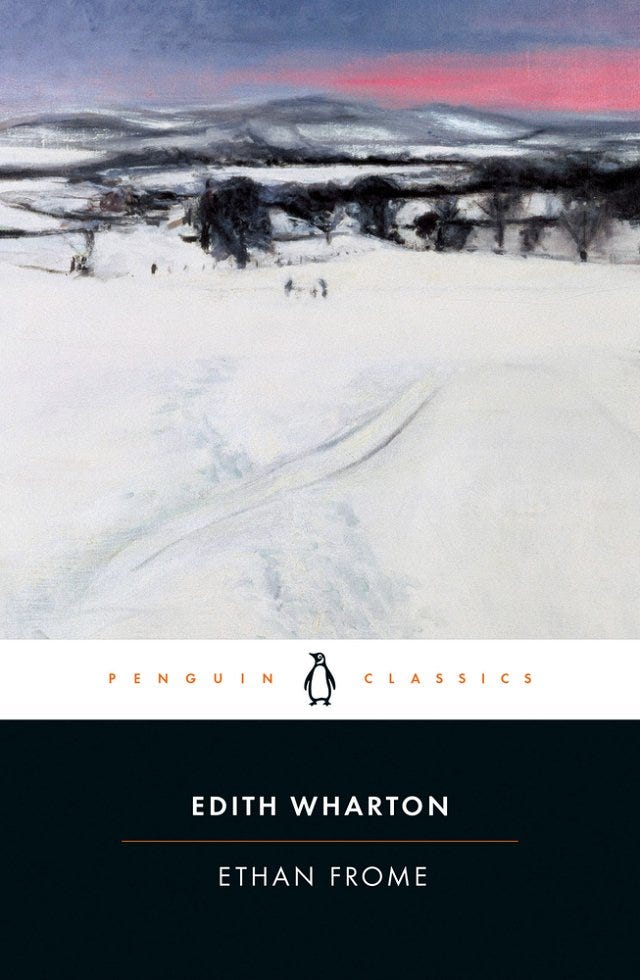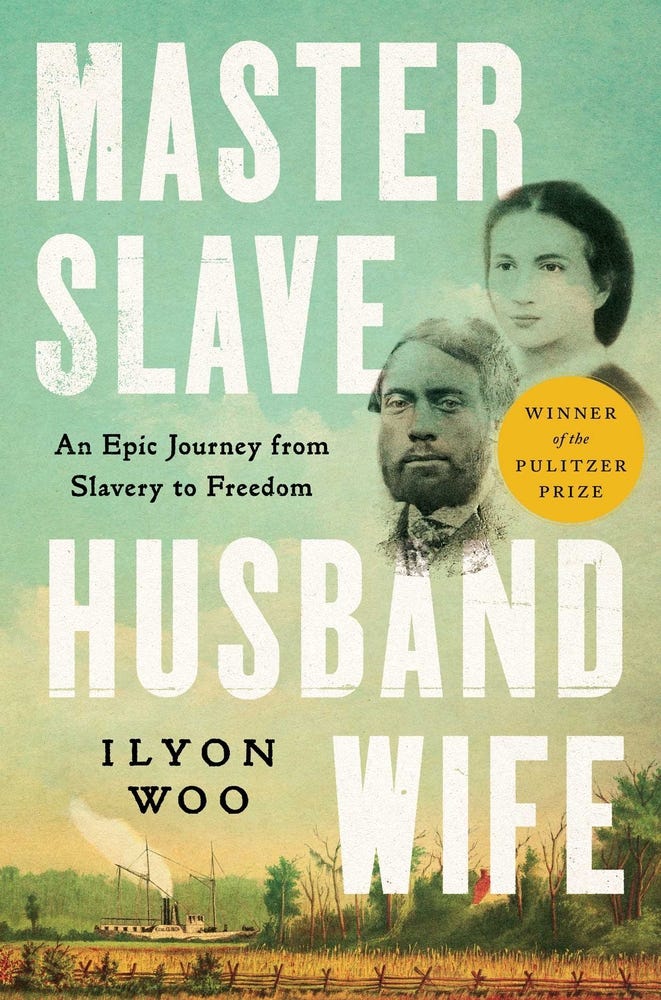Bookworm: February 2025
'Ethan Frome,' 'Being Wrong,' 'Master Slave Husband Wife,' 'Cyanide and Sensibility,' 'The Antidote'
This post contains an affiliate link or links. If you use a link to buy a book, I may earn a small commission. You can find all the books that have been featured in this newsletter in my Bookshop store.
Today is Feb. 28. As a Taiwanese American, I think of this day as the 78th anniversary of “the 2-28 incident.” Very briefly: Feb. 28, 1947, saw the start of a popular rebellion in Taiwan against the repressive and corrupt Chinese Nationalist government, which responded by slaughtering civilians. Estimates of the death toll range from 18,000 to 28,000. The Nationalists later imposed martial law, making it dangerous to talk about the mass killings. During my childhood, my mother instinctively lowered her voice when she brought up 2-28 and warned me not to mention it in public, even though we were 7,000 miles away in America.
Shawna Yang Ryan’s 2017 novel “Green Island” offers an absorbing, devastating take on one family’s experience of an era that’s become known as the White Terror.
Today, Taiwan is a democracy committed to a day of remembrance on this date, known as Peace Memorial Day.
Table of contents
Classic literature: “Ethan Frome,” by Edith Wharton
Nonfiction: “Being Wrong: Adventures in the Margin of Error,” by Kathryn Schulz
American history: “Master Slave Husband Wife: An Epic Journey From Slavery to Freedom,” by Ilyon Woo
Cozy mystery: “Cyanide and Sensibility,” by Katie Oliver
“Ethan Frome”
I do The New York Times Crossword daily and almost always get the literary clues. A recent puzzle, though, referred to a literary character who was a total stranger to me —Zeena in Edith Wharton’s novella “Ethan Frome.”
How had I not encountered this book in high school, college or thereafter? Turns out my literary education has been rather Wharton-deficient. My main exposure to her work seems to have been the 1993 film adaptation of “The Age of Innocence.”
A local library obligingly provided a copy of “Ethan Frome,” and it turned out to be an apt February read. This is a chilly, bleak book in which the snow that lies thickly over much of the narrative represents the smothering of hopes and dreams, the chilliness of a marriage made out of fear of solitude, the cold sting of a dead romance.
The title character appears first to the unnamed narrator as a silent middle-aged man, his body left askew by an accident. The narrator is, naturally, curious about Frome’s story but is unable to learn it until a wintry blast strands him near Frome’s farm. He’s then invited to stay overnight, and has the whole sad saga revealed to him.
If you’ve yet to read the book, be prepared for a story about how a blizzard of societal and moral constraints can bind us as tightly in place as any natural storm.
“Being Wrong: Adventures in the Margin of Error”
My first “real” job, as in one with benefits and vacation days, was as a copy editor. This was an interesting way to enter the world of work, because copy editors specialize in looking for what’s wrong. It was the rare colleague who welcomed a call, visit or message from a copy editor.
One of the best things about working as a copy editor was that it instilled, in me at least, a high comfort level with being wrong. Not that I enjoy making mistakes — to the contrary. And not that I don’t revel in being right. But I saw daily how easy it was to make errors even with the best of intentions and even with systems designed for error prevention in place. To err truly is human.
So when someone (I apologize that I cannot remember who) recommended Kathryn Schulz’s book “Being Wrong,” I promptly put it on my reading list.
“Being Wrong” argues that we’re best off when we own our mistakes, learn from them and move on. Easier said than done. When the book came out in 2010, Schulz told NPR that we have a hard time admitting we’re wrong:
… we're terrified of feeling out of control. We're terrified of not having the answers, and we would sometimes rather assert an incorrect answer than make our peace with the fact that we really don't know.
Too, there are the times when deciding that we’re wrong can lead to an existential earthquake, as with one woman Schulz writes about who decided she’d been wrong about her faith, turned away from it, and found herself plunged into a years-long identity crisis.
Schulz went on to do a Ted Talk about “Being Wrong.” In it, she argues that stepping outside our need to feel right is the “single greatest moral, intellectual and creative leap you can make.” The question is, who’s willing to take that leap?
“Master Slave Husband Wife: An Epic Journey From Slavery to Freedom”
Ilyon Woo’s Pulitzer Prize-winning book “Master Slave Husband Wife: An Epic Journey From Slavery to Freedom” is instantly enthralling. Before dawn on a December morning in the pre-Civil War South, a young couple puts in motion a bold plan to escape slavery. He cuts her hair. She replaces her dress with a man’s shirt, vest, hat, cloak, pants and boots. With the light complexion she inherited from her white father, she’s now a young white son of privilege setting off on a trip. With his dark skin, he’s now posing as her enslaved servant.
Imitating the mannerisms of the white family that owns her, Ellen Craft slowly makes her way by train and boat from Macon, Georgia, to Boston. Her husband, William Craft, is so attentive that many a white onlooker remarks approvingly on his devotion to his master. Still, as they hide in plain sight, the Crafts attract their share of suspicion. When they’re briefly separated after William falls into an exhausted sleep and misses a transfer, Ellen can’t quite hide her panicked reaction and draws a few digs at her manhood. Others notice her small hands and feet. Then there are all the checkpoints they must navigate, some requiring documents.
In Boston, the Crafts’ feat becomes public and they become celebrities, mingling with the likes of Frederick Douglass on the abolition lecture circuit while savoring a life of freedom. Ellen Craft was often heard to say that she wished her “old mistress” could see her now.
Woo first learned of the Crafts’ extraordinary story while she was a doctoral student at Columbia University. She has thoroughly researched their journey, relying on a memoir they wrote as well as contemporaneous newspapers, which were incredibly detailed in their coverage.
And she does a wonderful job of illuminating the complex political context of the day. Bostonians were generally pro-abolition, but more than a few people, including the much-lauded senator and orator Daniel Webster, thought it pragmatic to comply with the Fugitive Slave Act that required the return of enslaved people found anywhere. This kept the Crafts in a constant state of anxiety, and eventually they left the U.S. altogether, settling in England with the help of supporters who included Lady Byron (yes, the wife of Lord Byron, the poet). They would eventually return to America, even to the South, but not for many years.
“The story they lived is not neatly told,” Woo writes.
It offers no easy dividing lines between North and South, Black and White — no single person or place to blame. It is a story that holds the entire United States accountable and resists the closure of a happily ever after.
“Cyanide and Sensibility”
If you’re a real Jane Austen fan, then you know that 2025 is a very special year: the 250th anniversary of her birth. I started my personal celebration of this momentous milestone by re-reading her first published novel, “Sense and Sensibility” (1811) in January. Then I walked by a Little Free Library and found this paperback with a classic cozy mystery title and Austen’s name on the cover. Of course I grabbed it.
(Even with a cover I didn’t care for. The amateur detective who inserts herself into a local murder case is definitely not a teen, as the illustration suggests. Maybe it’s the Regency dress and long flowing locks that make her look so young.)
Author Katie Oliver doesn’t strictly follow the plot of “Sense and Sensibility” or any other Austen novel. “Cyanide” is the third book in what appears to be a “loosely inspired by Austen’s characters” series, with plenty of Easter eggs scattered throughout to satisfy Austen devotees.
Playing the role of Austen’s most popular heroine, Elizabeth Bennet, more or less, is English professor and Austen scholar Phaedra Brighton. At the moment, the drama in her life is that her beloved sister is about to fulfill her longtime dream of opening a patisserie in their small town. Alas, on opening day a customer picks up a chocolate cupcake, samples it and drops dead moments later. Phaedra realizes to her horror that she was about to share that cupcake with her father. She proceeds to track clues, encounter red herrings, meet quirky characters, ponder motives, foil another murder attempt, and explore other cozy mystery tropes. You’ll likely solve the case before she does, but I thought Oliver delivered a satisfying and logical villain.
Happy reading!





